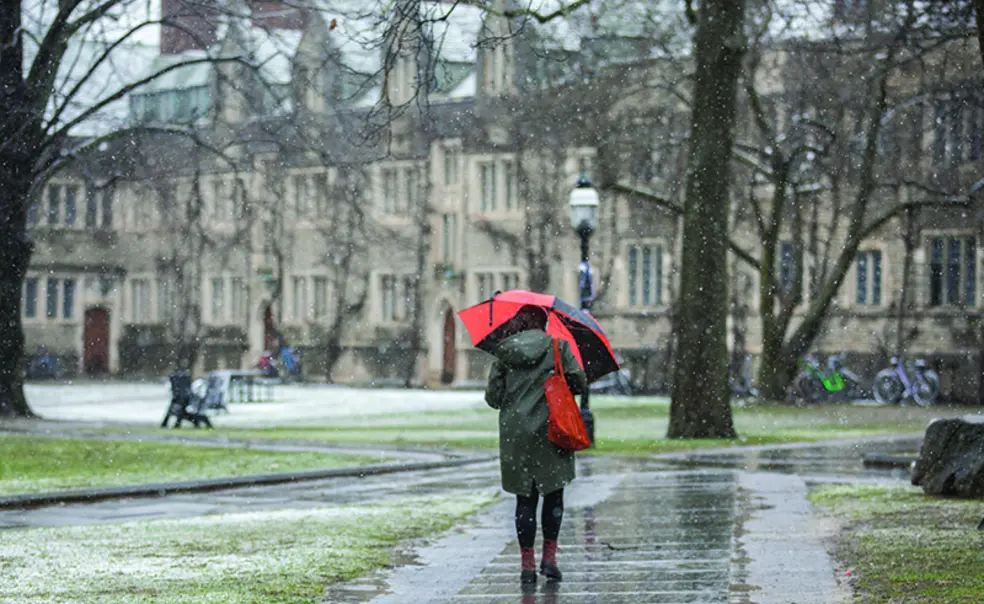After Three Student Deaths in 2022, Attention Returns to Mental Health
A working group published a mental health plan in September with 32 recommendations
Editor’s note: If you or someone you know may have suicidal thoughts, you can call the 988 Suicide and Crisis Lifeline or chat online at 988lifeline.org.
The ongoing conversation around mental health was once again brought to the forefront in December when the Mercer County Prosecutor’s Office announced that Misrach Ewunetie ’24 died by suicide in October.
The Middlesex Regional Medical Examiner’s Office concluded that Ewunetie died due to toxicity of bupropion and escitalopram, which are commonly used to treat depression, and hydroxyzine, which can be used to address anxiety or provide relief for allergic conditions.
Ewunetie was the third Princeton student to succumb to a mental health struggle in 2022 after Jazz Chang ’23 and Justin Lim ’25 died last May; a University staff member also died by suicide on campus in September.
“I didn’t know Misrach, Jazz, or Justin personally, but I hope that their names are never forgotten in our community,” Preeti Chemiti ’23, a School of Public and International Affairs (SPIA) student and co-writer of “Mind Matters,” a mental health guidebook, told PAW via email. “Their stories and identities are important to remember individually, as well as for the impact that they have all had on Princeton.”
Following the deaths of Chang and Lim, administrators and undergraduates formed a working group that published a mental health plan in September that included 32 recommendations aimed at improving and expanding mental health resources for students.
In a December update, Rochelle Calhoun, vice president for campus life, wrote that 65% of the recommendations have been implemented, including the November launch of the Counseling and Psychological Services (CPS) Cares Line, which gives students 24/7 access to a counselor by phone. The line had been used 98 times as of Jan. 3, according to Calvin Chin, director of CPS.
Administrators acknowledge there is more to be done. Calhoun’s email said three more recommendations should be completed by this spring: the development of a well-being check system that does not rely entirely on Public Safety, identification of funding for transportation to off-campus mental health care, and increased funding for off-campus care.
Maryam Kamel ’23, a molecular biology major and New College West peer health adviser, told PAW via email that while she believes Princeton provides a wide range of resources, the University also should better encourage students to take advantage of those resources throughout the year, and not just in the wake of tragedy. More consistent outreach would help to “better normalize the concept of self-care and remove stigma around help-seeking,” she said.
She added that “universally adopting more flexible policies to accommodate the complexities of students’ lives could go a long way in reducing unnecessary stress.”
SPIA major Dillion Gallagher ’23 said that Princeton students “want the academic rigor, but we want it in such a way that we can also stay healthy and that we can also take care of ourselves.”
Lucy McBride ’95, an internal medicine physician, said Princeton doesn’t need to loosen its rigorous academic standards, but she urged the institution to “meet people where they are, which may include taking certain classes down a notch, but it may include taking certain classes up a notch. I just don’t think there’s a one-and-done prescription for well-being.”
McBride also recommends that Princeton leaders model good mental health care by taking time off to rest and reflect, as well as talking about mental health in a matter-of-fact way.
Mental health advocate Cam Stout ’80 suggests hiring a “mental health ambassador” — someone with their own lived experience who could speak candidly with students. He also recommends seeking out mentors and what he calls a “SEAL team” to provide “support, energy, accountability, and love — sometimes tough love.”
Gallagher, who lived in Scully Hall alongside Ewunetie but didn’t know her, credits student advocacy for bringing about the September mental health report. He said, “The administration should be proud that it committed to the things that it did. And as they’ve said, and as most students have said, it’s a step in the right direction, and it’s a big step. But it is just that — it’s a step in an ongoing conversation.”












1 Response
Cameron Haight ’95
3 Years AgoDelicacy in Disclosure
I applaud PAW for covering mental health issues. For some of us who have lived decades with these concerns, Princeton was a formative time, both for ourselves and for our illnesses. It is heartening to see language around suicide evolve, from “committed” to “died by,” and, more recently, “succumbed to.” I am curious though about the decision to publish the mix of pharmaceuticals that was blamed in one death. Does this information help us prevent further suicides? Or does it provide more anxiety to those suffering enough. Not talking about the means is no solution. Let’s make it a healthy part of the dialogue, too.